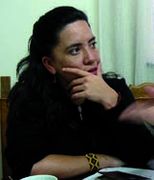Article published in the special Newsletter '15 years of PBI', October 2009
Pascal Blum, volunteer from Switzerland (2007-9)
For four months, 14.000 people in the Magdalena Medio region demand their rights in the city of Barrancabermeja.
In 1989, Berenice Celeyta founded SEMBRAR, an organisation that she left in 1992 to form the Association for Alternative Social Promotion (MINGA). This organisation operates in the north-east of the country, in the department of Norte de Santander and the Magdalena Medio region. With MINGA, Berenice carried out criminal investigations, provided legal advice and, above all, worked on issues related to forced displacement and the return of displaced people. In 1999, she began to work in the Valle de Cauca department with the Association for Investigation and Social Action (NOMADESC), which focuses on economic, social and cultural rights 1.
PBI: Is there any event in your working life which is engraved in your memory?
Berenice Celeyta: Yes, in 1998 I was working with MINGA in Barrancabermeja. That year, there was a mass exodus of small farmers and miners from Sur de Bolívar department. About 14.000 people fled the area: some came on foot, others by boat or by bus. They arrived in Barrancabermeja and looked for somewhere to stay. They began to occupy various places, such as schools, colleges, and the Human Rights Ombudsman’s offices. The exodus lasted more than four months during which the city was completely packed. The living conditions for the people who had been displaced were terrible. There were children and pregnant women. I think that the first fortnight was the worst because there were no suitable living spaces, and people even lay on the ground. In addition, so many people packed in the same place - up to 1.000 in a single school - spread a lot of disease.
PBI: What was the reason for the exodus?
BC: At the end of 1997 and beginning of 1998, many crimes against humanity were committed in the region. At that time, the paramilitary activities in Magdalena Medio were very violent. There were three Blocks concentrated in the region: the Peasant Farmers’ Self Defence Groups of César, the Southern Bolívar Block, and the Magdalena Medio Block. They carried out several massacres, but the direct cause of the exodus was the massacre in Cerro de Burgos, a port an hour away from Simití. It was a massacre which spread terror throughout the population. The paramilitaries arrived at Cerro in four boats, entered a pool hall, dragged out the people and killed them. They travelled round the area and went to houses calling for the people named on the lists. The people who lived in the area had no choice but to leave their homes if they wanted to stay alive. However, the exodus was also a message to the government that it needed to solve the paramilitary problem in the region.
PBI: What happened during the exodus and what was MINGA’s role?
BC: At the beginning of the exodus, we started negotiations with central government, which we attended as MINGA. The meetings were attended not only by the small farmers, but also by the miners, a range of organisations from southern Bolívar, and civil society organisations from Barrancabermeja. They were high-level negotiations, primarily with Presidents Samper and later Pastrana. As they were so long and complicated we had to go to Bogotá to carry out advocacy work. In parallel with the negotiations there were activities such as a commission of verification with the international community and a negotiating committee, which still operates today, 10 years later. MINGA was present at every stage of the negotiations.
PBI: What were the demands of the victims of this displacement?
BC: Basically they were the creation of a Bloque de Búsqueda (Search Unit) to combat the paramilitary groups, and demands for decent living conditions. Obviously, the Bloque de Búsqueda never materialised, because after the displaced people returned there were even worse massacres. The miners specifically wanted to continue to mine gold in the traditional way, and not with modern techniques involving cyanide and mercury. They did not agree with the multinationals entering their territory, still less so under the circumstances in which it was happening. When one of the miners’ leaders was assassinated (they cut off his head and played football with it), the paramilitaries said that they were cleansing the area so that the multinationals could enter it. Another issue was the introduction of the African palm monoculture. Palm plantations were being introduced throughout the region, and the small farmers received no benefit from this. Quite the opposite – it was clear that the operators and beneficiaries were the paramilitaries. The companies which introduced African palm were made up of people known for their links with paramilitarism.
PBI: What did the small farmers and miners gain from all of this in the end?
BC: I think, on the one hand, not being definitively driven from their territories. They created a very strong resistance movement within their communities which has allowed them to stay in the region despite the conflict. The war enabled them to learn about human rights, to know their own rights. However, it will soon be the 10th anniversary of the government’s failure to honour the agreements. To sum up, while they have gained in some respects, they still live in sub-human conditions. Their situation has not improved.
1 The «DESC» of «NOMADESC» is the Spanish acronym for economic, social and cultural rights

